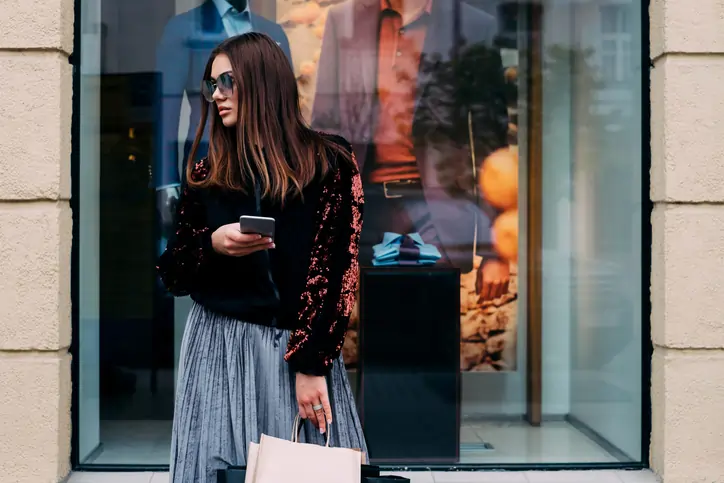
Elevating Luxury: Social Media’s Brand Impact
Historically, luxury brands have focused on creating an exclusive, prestigious, and well-made image. For many customers, their exquisite attention to detail, classic designs, and small batch sizes have created an air of desire. But social media’s ascent has drastically changed the nature of the consumer market. Today’s digitally connected audience actively seeks information and brand engagement, often placing a premium on authenticity and openness.
Social media provides luxury brands with a distinctive platform to enhance their image and establish connections with new audiences while upholding their core values of exclusivity, prestige, and craftsmanship. This is because social media is transparent and easy to use. Luxury brands can effectively utilize social media to foster stronger customer relationships and attain greater prosperity in the digital era through deliberate content creation, community development, and personalization.
This article explores social media’s impact on luxury brands, making it particularly useful for those pursuing a luxury brand management degree at a university such as Richmond American University London. Let’s dive right in.
Challenges of Social Media for Luxury Brands
For luxury brands used to a more controlled brand image, the very characteristics that make social media so powerful can present difficulties. Here’s a closer look at a few possible danger areas:
Preserving Exclusiveness: Luxury has always thrived on the unattainable and mysterious. The transparent nature of social media may weaken this carefully constructed image. Careful planning and content strategy are needed to balance showcasing the brand’s heritage and craftsmanship and maintaining a sense of exclusivity.
Danger of Brand Dilution: Excessive use of social media can dilute a brand’s identity and lower the perceived worth of high-end products. The frequency and type of content luxury brands produce must be carefully considered to maintain a high level of quality and prevent their audience from feeling overstimulated.
Managing Negative Remarks and Upholding Brand Image: Because social media is an open forum, it can attract criticism and negativity. Luxury brands need to be ready to respond to criticism and comments promptly and courteously to maintain their reputation and show that they care about their customers’ issues.
Strategies for Luxury Brands to Thrive on Social Media
Luxury brands have a dynamic opportunity to maintain prestige and establish deeper connections with a larger audience through social media. These are some essential success strategies:
Curated Content Strategy
Superior Images and Narration: Visuals are essential to social media’s success. Luxury brands can take advantage of this by producing engaging content highlighting their products’ superb craftsmanship and extensive history. The story of the brand and the emotional bond with its products can be effectively communicated through crisp photos, brief videos, and visually stimulating storytelling.
Influencer marketing: Creating alliances with social media influencers who share the same values as the brand can be a very effective tactic. These people, frequently trendsetters or industry experts, can produce genuine content that connects with their audience and exposes the brand to a new market. The secret is choosing influencers who can legitimately convey the brand’s message and truly fit the brand image.
Emphasizing the Human Factor: Luxurious products frequently incorporate human talent and creativity. Social media allows brands to highlight the gifted designers, craftspeople, and artisans that create their goods. This human touch makes the brand story more relatable and encourages a greater appreciation for the effort and knowledge that go into each piece.
Engagement and Community Building
Two-Way Communication: High-end companies ought to go beyond merely putting out messages. Social media presents a special chance to promote two-way customer communication. Direct messaging, polling, and replying to comments show that a brand is responsive and fosters a feeling of community.
Exclusive Online Experiences: Brand devotees can benefit from exclusive online experiences made possible by social media. This could be giving early access to sales, previewing products, or holding virtual events. These invitation-only events increase patron loyalty and foster a feeling of privilege.
Behind-the-Scenes Access: Brands can look inside the world behind their products by utilizing social media features like stories and live streams. This might feature exclusive events, production workshops, or design studios. Giving potential consumers this behind-the-scenes access promotes transparency, humanizes the brand, and increases their sense of trust.
Personalization and Customer Experience
Data-Driven Content: User behavior and interests are valuable data sources social media platforms provide. Using this data, luxury brands can target specific customer segments with their promotions and content. As a result, every user will have a more pertinent and interesting experience.
Personalized Customer Service: One way to provide individualized customer service is through social media platforms. Through direct messages, brands can provide timely and competent assistance, resulting in positive customer interactions and stronger relationships.
Social listening: Brands can watch online discussions and gain insight into consumer preferences using social media listening tools. This feedback can be extremely helpful to modify campaigns and ensure the intended audience understands the brand messaging. Luxury brands can adapt to changing consumer needs and continuously improve their approach by actively listening to their customers on social media.
Conclusion
Without a doubt, social media has changed the game for luxury brands. Although these platforms’ natural openness and accessibility may seem at odds with the idea of luxury, social media presents a strong chance for brands to improve their reputation and reach new markets in creative ways.
Social media is a potent instrument that is just waiting to be used. We may anticipate luxury brands becoming even more skilled at utilizing these technologies as social media platforms develop and offer new features and functionalities. The future of luxury is probably in how well a brand combines its history and skill with cutting-edge digital experiences to meet the changing demands of a consumer base that is accustomed to using technology.


